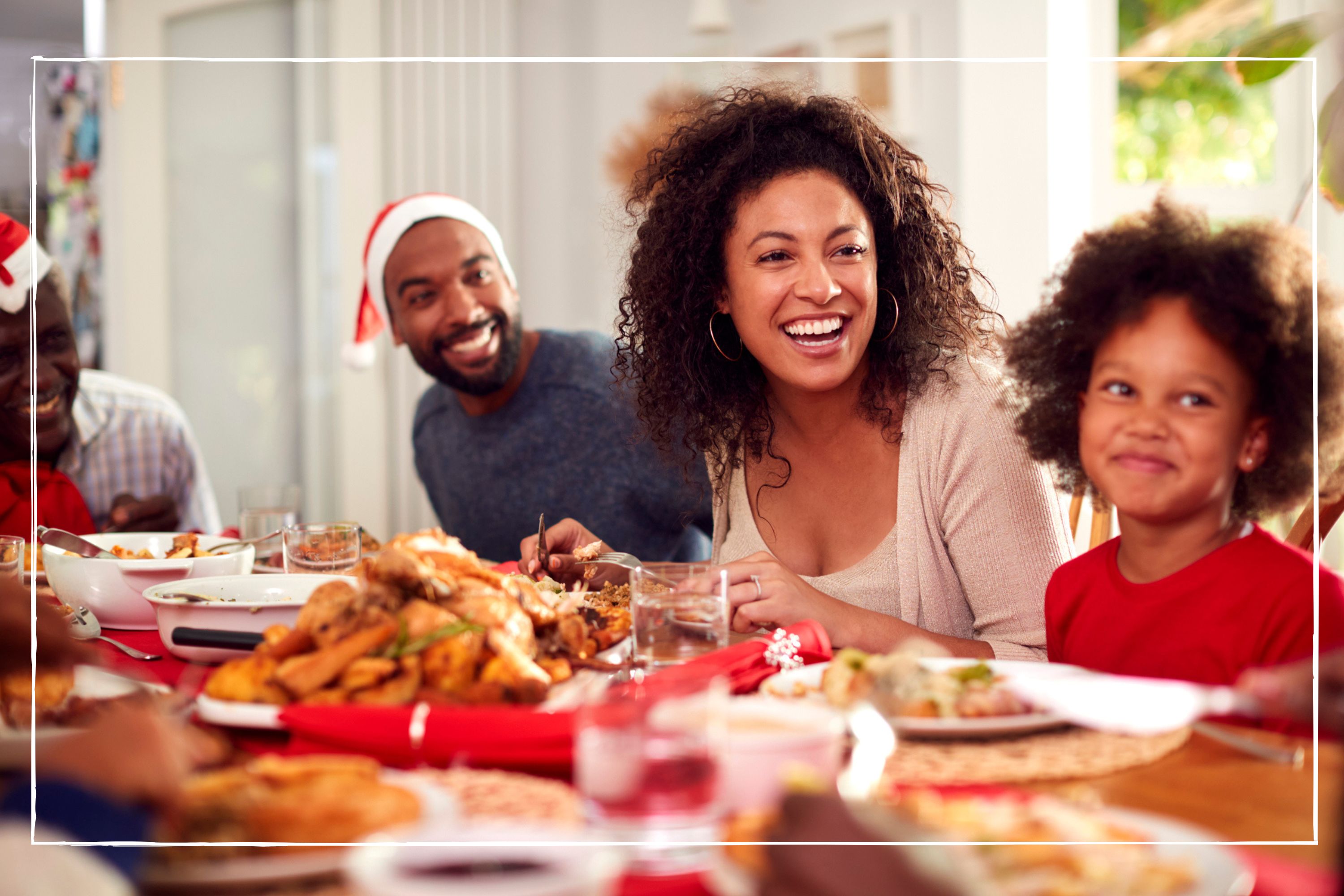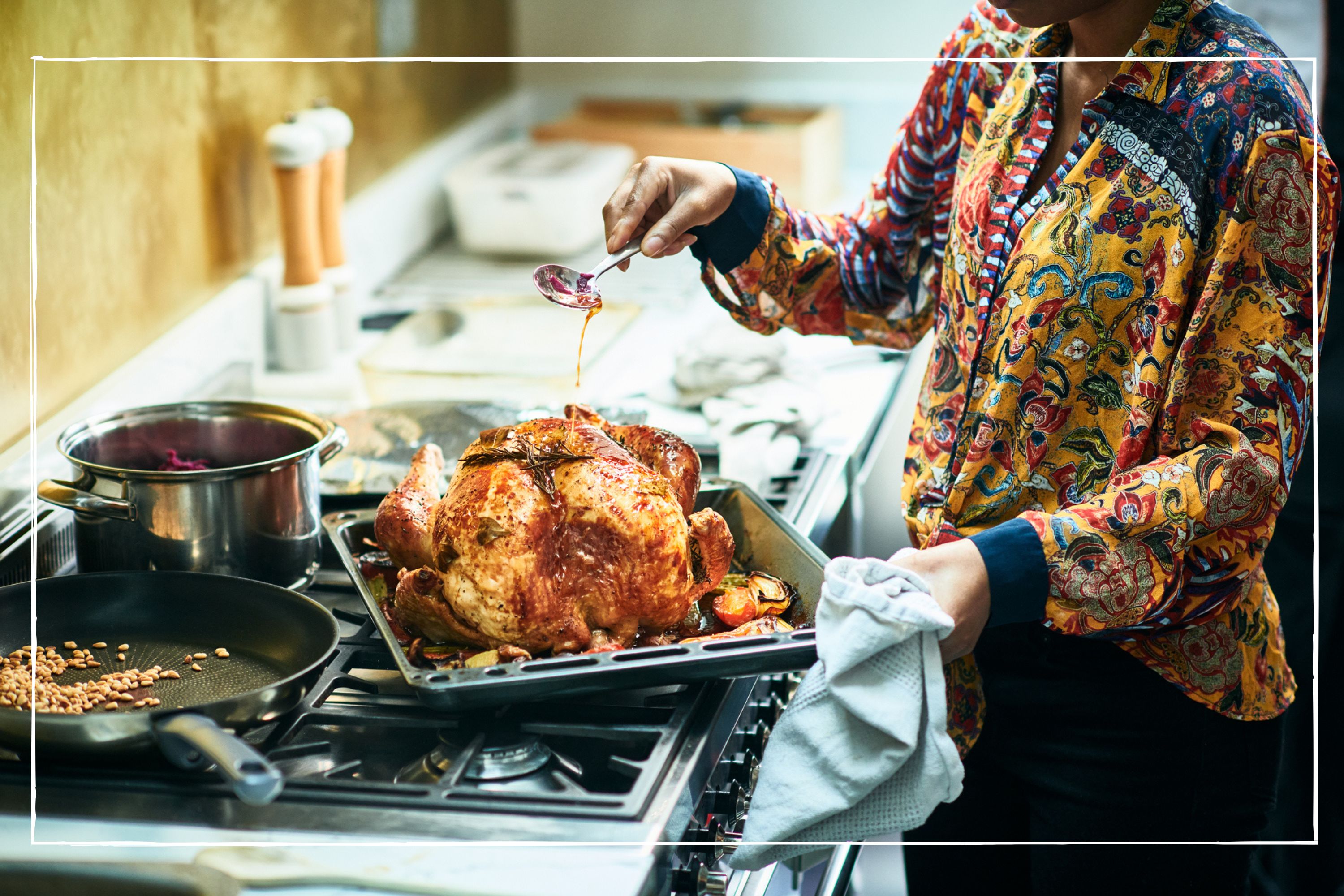How much does it cost to cook a Christmas dinner? Plus ways to keep costs low
As the big day gets closer, you might be wondering how much does it cost to cook a Christmas dinner? We’ve done the sums to find out


Parenting advice, hot topics, best buys and family finance tips delivered straight to your inbox.
You are now subscribed
Your newsletter sign-up was successful
How much does it cost to cook a Christmas dinner is an important question to ask at a time when both food prices and energy bills are soaring.
With Covid-19 having disrupted the last two years of Christmas celebrations, many people will be hoping to enjoy the festivities in style this year. But as the cost of living continues to spiral, families are concerned about how to save money and how much their energy bills will cost. So it's important to start looking for ways to cut the cost of the big day.
Goodto.com’s Money Editor, Sarah Handley, says: “Christmas is an expensive time of year and many families will be thinking about how much they can realistically afford to spend on presents, decorations and food. Fortunately, there are ways you can cut these costs, including reducing how much you spend on your Christmas dinner.”
There are plenty of options when it comes to how to save money for Christmas - and being wise about your costs when making Christmas dinner is a key factor to think about.
How much does it cost to cook a Christmas dinner?
It costs £49.37 to cook a traditional Christmas dinner (not including dessert) for eight people, factoring in the cost of both food and energy.
However, exact costs will depend on a number of factors, including:
- where you do your shopping (check out our guide to the cheapest supermarkets if you want to switch)
- how many people you are feeding
- whether you have a gas or electric cooker
- how much you pay for your energy.
For our calculations, we’ve used the Energy Price Guarantee’s electricity unit price of 34p per kWh. We’ve also used the example of an electric oven to cook a medium 4kg turkey for 8-10 people.
Parenting advice, hot topics, best buys and family finance tips delivered straight to your inbox.
A 4kg turkey should take around 2 hours, 30 minutes to cook (find out more about how to calculate Christmas turkey cooking times in our handy guide). A typical electric oven uses about 3,000W of power which means it currently costs about £1.02 an hour to run. Assuming you leave your oven running for three hours in total (to cook other food as well as the turkey), your oven costs will be £3.06.
Our calculations also factor in using a hob to cook vegetables. A typical electric hob uses 2,000W of power, which means that an hour’s use will cost you around 68p.
If you’re wondering if electric is cheaper than gas for cooking, the answer is no. The typical cost per unit under the Energy Price Guarantee is 10.33p per kWh for gas, compared to 34.04p per kWh for electricity.
Cooking with a gas oven uses less power at around 1,540W and will cost 16p an hour to run, or 48p for three hours. A 2,000W gas hob would cost you around 21p an hour. That means your total Christmas dinner costs would be lower at £46.32.
For food costs, we’ve used the following shop from Tesco to work out our calculations - where possible we’ve chosen the lowest cost option. Check out our new guide if you're worried about why turkey prices are going up and whether there could be a turkey shortage this year.
| Item and weight/pack size | Price |
|---|---|
| Turkey (4kg) | £26 |
| Turkey gravy (2 x packs) | £2 |
| Potatoes (2.5kg) | £1.49 |
| Sage and onion stuffing balls (12-pack) | £2.35 |
| Yorkshire pudding (12-pack) | £1.30 |
| Pigs in blankets (2 x 12-pack) | £6 |
| Parsnips (1kg) | £1.24 |
| Brussel sprouts (2 x 400g packs) | £4 |
| Cranberry sauce (200g) | 80p |
| Carrots (1kg) | 45p |
| Total cost | £45.63 |
Prices correct at the time of writing.
Full breakdown of Christmas dinner costs
| Row 0 - Cell 0 | Cost (using electric oven) | Cost (using gas oven) |
| Food | £45.63 | £45.63 |
| Oven (3 hours) | £3.06 | 48p |
| Hob (1 hour) | 68p | 21p |
| Total | £49.37 | £46.32 |

How can you cut the cost of cooking a Christmas dinner?
You can cut the cost of cooking a Christmas dinner in a number of ways, as we outline below:
Cook your turkey the right way up
According to Veebha Parmar, chef and inventor of cooking tool MySpike, it’s best to cook your turkey vertically rather than horizontally. She told us: “Not only does this make it deliciously moist, it dramatically reduces cooking time as it improves air circulation and, if you use a spike which conducts heat, it will cook from the inside out. Having the turkey upright also frees up space in the oven so you can cook more things at once, again reducing energy costs, and by adding your roasties/ vegetables to the tray below so they will be getting the delicious flavours dripping down on them. Triple win!”
Ditch the turkey completely
Alternatively, you could ditch the turkey altogether. Consumer expert Jenny McCormac at review site BrandRated, says: “The price of frozen turkeys has risen by up to 32% this year, compared to last year. There are fewer frozen turkeys available this year due to the bird flu outbreak earlier this year, when as much as 35% of this year’s Christmas flock was lost. The average price for a frozen medium turkey is now £18-20, or around £25 for a fresh one – if you’re able to get one! Turkey is generally the most expensive element of a Christmas dinner so try some different options to save some money.”
Pre-cooked turkey crowns or even turkey thighs will be cheaper, but you could also switch to a Christmas turkey alternative like chicken or try a vegetarian option such as a nut roast or goats cheese and cranberry parcel.
Use a different cooking method
It’s no secret that air fryers and slow cookers are on many people’s Christmas lists this year. And using one to cook your Christmas dinner could help reduce your energy bills.
Energy saving expert at Love Energy Savings, Ava Pope, says: “You can save money by using a slow cooker to cook your turkey, or whatever other meat you choose this Christmas. A 3kWh electric oven costs £1.02 an hour to run when running at full power, while a slow cooker costs just 5p per hour.
“Cooking roast potatoes in your air fryer will be cheaper than turning on your oven, and air fryer fans swear by the crispy coating they’ll be given using this method. You could also use an air fryer to cook parsnips, pigs in blankets, and stuffing balls - all you need is a paper and pencil to jot down the cooking times.”
Another option is to use a microwave to cook your veg - simply pop them in a microwaveable bowl with a little water and whizz on high for a few minutes.
Take a look at the guides below to find out more about the running costs of these appliances:
- How much does it cost to run an air fryer?
- How much does it cost to run a slow cooker?
- How much does it cost to run a microwave?
Shop wisely
There are many ways you can save on the cost of your food shop, whether that’s shopping in the cheapest supermarket or using a supermarket loyalty card.
It also pays to be careful about the food you buy, including avoiding pre-packed vegetables which will be more expensive. A little planning will also ensure you don’t end up with a lot of leftovers.
Phoebe Ellis from Thrive Money says: “Before you do your shop, make lists of exactly what you need, when and for what recipes. By doing this instead of just walking into the supermarket and picking up things, you will be saving more on your shop and wasting less.”
Chef and co-founder of online cooking community Sorted Food, Ben Ebbrell, adds: “Try portioning out the veg in your hands before cooking. A large handful of unprepared sprouts per person is usually plenty, and buy them loose at the shops. It prevents you from just buying the pre-packed bag, prepping them all and then having some left over at the end of the meal. The same applies to root veg and roast potatoes… count them out… don’t just guess and then do a few more ‘just in case’.”

Mum of two, Rachel is a freelance personal finance journalist who has been writing about everything from mortgages to car insurance for over a decade. Having previously worked at Shares Magazine, where she specialised in small-cap stocks, Rachel developed a passion for consumer finance and saving money when she moved to lovemoney.com. She later spent more than 8 years as an editor at price comparison site MoneySuperMarket, often acting as spokesperson. Rachel went freelance in 2020, just as the pandemic hit, and has since written for numerous websites and national newspapers, including The Mail on Sunday, The Observer, The Sun and Forbes. She is passionate about helping families become more confident with their finances, giving them the tools they need to take control of their money and make savings. In her spare time, Rachel is a keen traveller and baker.